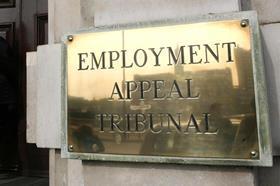A solicitor who argued he was entitled to 40% of the fees billed and paid in respect of work done by others for a client has had his appeal dismissed by the Employment Appeal Tribunal.

Alastair Dobbie, a solicitor and non-practising barrister, was engaged by Feltons Solicitors under an agreement in which he carried out duties as a consultant and was entitled to 40% of the fees billed, paid and received by the firm. The employment tribunal found he was entitled to fees calculated on the basis of fees billed and paid for in relation to the work he had done personally and not for work done by other fee earners.
Dobbie, admitted in 2014, worked for the firm from 2010 until 2016. He appealed the ET’s findings on three grounds arguing that the employment judge had been wrong to find he was entitled to only £5,000 in respect of work for the client. Under the agreement, he argued, he was entitled £10,000, representing 40% of all fees billed.
In Alastair Dobbie v Paula Felton t/a Feltons Solicitors, Michael Ford KC, deputy High Court judge of the High Court, said the employment judge was ‘entitled - and right - to conclude’ that the disputed clause in the agreement ‘did not entitle the claimant to 40% of all the fees billed and paid in respect of the work performed by other fee earners. Rather…he was only entitled to 40% of the fees billed and paid in respect of his work for client A in the relevant months’.
Read more
The judge noted the ‘important contextual indication that the clause is aimed at work done by the consultant personally’ and the firm’s construction that the clause was restricted to work done personally by the consultant ‘fits much better with commercial common sense’. He added: ‘By contrast, some of the consequences of the claimant’s interpretation border on the ludicrous.’
The judgment said other provisions in the contract suggested the consultancy agreement is ‘an agreement of remuneration in return for personal services by the consultant’ and at the time of entering the agreement, Dobbie was ‘aware of the standard arrangement that [the firm] had with consultants that they were paid 40% of the fees billed’.
It added that the employment judge had reached the ‘correct conclusion on the interpretation of the consultancy agreement’.
Dismissing ground 3 of Dobbie’s appeal, the EAT said though it found the employment judge erred in respect of ground 1 it was rendered ‘academic and immaterial’. The judge added: ‘The upshot is that I dismiss the appeal.’


























